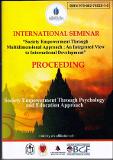The Correlation Between Peer Social Support And Self-Regulated Learning
Abstract
The purpose of this study was to identify the correlation between the peer social support and self-regulated learning. In order to achieve this goal, 165 college students of University of HKBP Nommensen were tested. The instruments used are peer social support questionnaire and self-regulated learning questionnaire. The peer social support questionnaire consisted of five dimensions: emotional support, instrumental support, informational support, esteem support, and networking support. In other side, the self-regulated learning questionnaire included cognitive, motivational, and behavioral aspects. Before using these instruments for the study purpose, they were tried out in terms of their validity and reliability. Based on the reliability test and item analysis, it can conclude that the two instruments are reliable and valid. In order to test the hypothesis, data gathered was analyzed using Pearson Correlation Coefficients. Since this technique of data analysis requires fulfillment of normality and linearity assumptions, data gathered were tested using one sample Kolmogorov-Smirnov test and a compare-means (analysis of variance) test. The results indicated that the two assumptions were fulfilled. Then, the Pearson Correlation Coefficients test showed that there was a positive and significant correlation between peer social support and self-regulated learning (rxy = 0.209; ρ <0,01), meaning that higher peer social support would be followed by higher self-regulated learning. Further analysis showed that the highest correlation coefficient and most significant dimensions of peer social support was the informational support in terms of its correlation with self-regulated learning.

